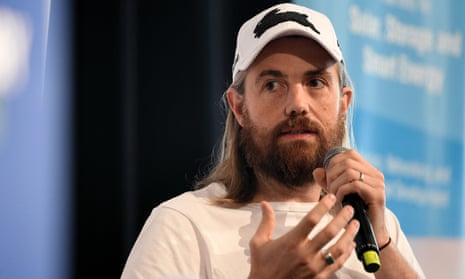Atlassian co-founder Mike Cannon-Brookes has thrown his support behind a climate action bill proposed by the independent Zali Steggall and has urged the major parties to put down the cudgels and support it.
And the Australian Energy Council, representing major electricity and gas businesses, said the Steggall bill deserved to be seriously considered as it had the potential to deliver certainty and a path forward for the national economy.
Cannon-Brookes said on Tuesday the Steggall proposal, unveiled this week, was “a smart bill, and the exact type of action we need to change Australia’s international reputation on climate”.
The bill includes a proposal for a net zero emissions target by 2050, a carbon emissions budget, and assessments every five years of national climate change risk. The MP has called on the major parties to bring the bill to the floor and allow a conscience vote.
Cannon-Brookes said the proposal contained all the elements of a viable settlement to the climate wars. “The legislated 2050 target and five-year increments are precisely what is required, and the bill deserves bipartisan support.”
Cannon-Brookes has been vocal in support of climate action in Australia, and has supported independents through Climate 200 – an environmental lobby group also supported by Simon Holmes à Court. But he has not played a hands-on role in drafting the current proposal.
Sarah McNamara, the Australian Energy Council’s chief executive, said Steggall’s bill was a considered attempt to find a workable framework and had the potential to move the country beyond the climate policy impasse.
“We would encourage that it be carefully considered and calmly assessed,” she said.
“It offers the potential for much-needed certainty and a clear path forward not just for the energy industry, but for the Australian economy. For our part we will be consulting with our members in the coming weeks to assess the bill in detail.”
It follows a declaration by the Business Council of Australia that Australia should work to achieve net zero emissions by 2050.
Q&AWhat is in Zali Steggall's climate change bill?
Show
Independent MP Zali Steggall – along with her fellow crossbenchers Rebekah Sharkie, Helen Haines and Andrew Wilkie – is seeking bipartisan support for a climate change framework bill aimed at transitioning Australia to a decarbonised economy.
This is what's in it.
• Aims to limit global warming to well below 2C, pursuing efforts to limit it to 1.5C above pre-industrial temperatures.
• Net zero carbon emissions target by 2050.
• To achieve the target, the minister creates an emissions budget.
• Establishes a Climate Change Commission to prepare a national climate change risk assessment every five years.
• The commission is made up of a chair, Australia's chief scientist and five other members – who must have experience in either climate science, business, agriculture, environmental management, energy, transport or regional development.
* The assessments cover the risks climate change poses to the economy, society, agriculture, environment and ecology.
• In response, the minister creates a national adaptation plan.
• The commission provides the minister with yearly adaptation plan progress reports.
• Decisions made under the Act must be based on the best available science.
• It abolishes the current Climate Change Authority, with the commission to take its place.
While the BCA has at times in its history has been riven on climate action, and has actively stymied progress, the organisation’s chief executive Jennifer Westacott told the ABC on Monday night the time had now come to deliver policy certainty.
“I reckon if we could get the two political parties to agree to that and legislate it, we would have made a massive advance in this country because we would know where we’re going,” Westacott said.
While the BCA in 2018 described Labor’s more ambitious 2030 emissions reduction target as “economy wrecking”, in 2019 it joined other groups in representing industry, unions, farmers and investors under the Australian Climate Roundtable banner in calling for policies that could put it on a path to net zero emissions.
On Monday night, Westacott characterised the Steggall proposal as “sensible”.
Steggall’s bill will not be brought on for debate unless either the government or Labor supports it reaching the floor of the House. The government has not yet made a decision but it is unlikely to support it.
On Tuesday morning, the Labor leader Anthony Albanese said it was highly unlikely the bill would be voted on “because that’s what happens with private member’s bills in the House of Representatives, unless the government agrees to allocate time for the bill, it will not be voted on”.
Albanese said the proposal was very well intentioned, and he “respected” Steggall for bringing it forward, but told the ABC “we are unlikely to have a conscience vote on climate change. What we’ll do is support action on climate change.”
The Labor leader said the opposition would commit to a long-term emissions reduction target “very soon” and, referencing an internal split within the Coalition about taxpayer backing for new coal plants, said: “I don’t think there is a place for new coal-fired power plants in Australia. Full stop.”
On Sunday, Labor’s deputy leader Richard Marles, in a particularly awkward interview, did not rule out the party supporting new coal developments, saying it would be a decision for the markets despite previously declaring it would be a “good thing” if the thermal coal market collapsed.
